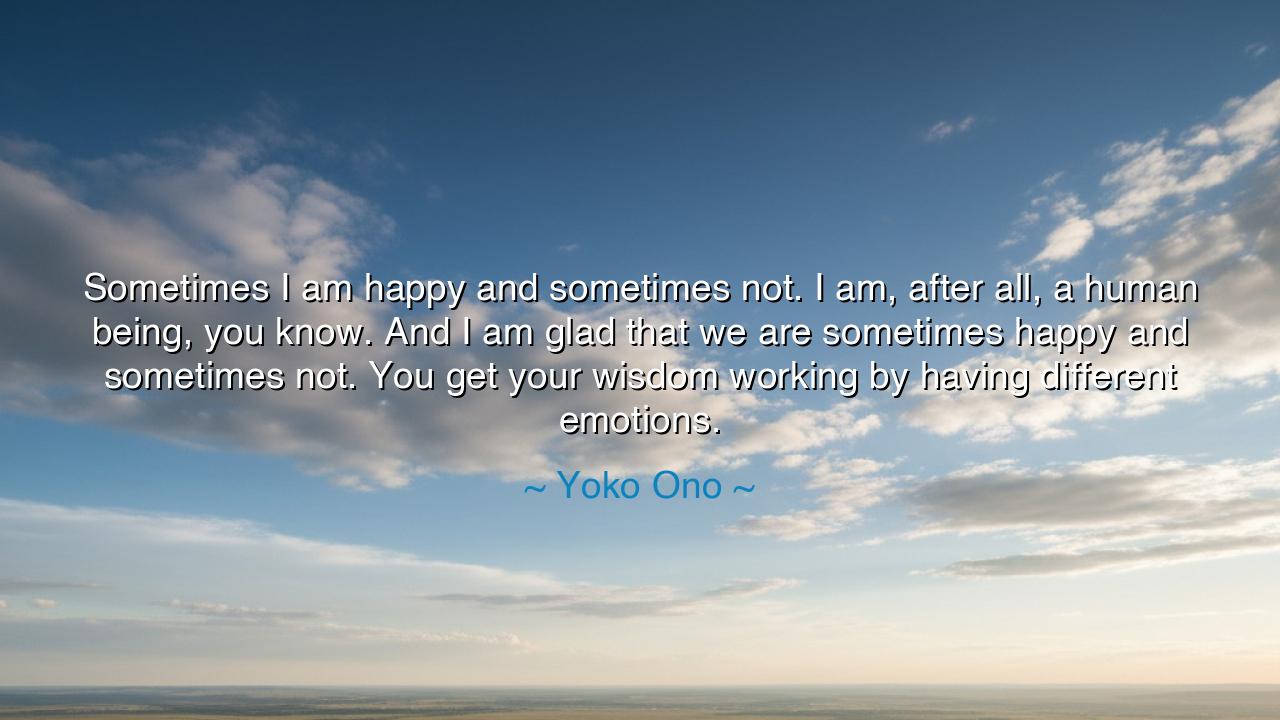
Sometimes I am happy and sometimes not. I am, after all, a human
Sometimes I am happy and sometimes not. I am, after all, a human being, you know. And I am glad that we are sometimes happy and sometimes not. You get your wisdom working by having different emotions.






“Sometimes I am happy and sometimes not. I am, after all, a human being, you know. And I am glad that we are sometimes happy and sometimes not. You get your wisdom working by having different emotions.” These words from Yoko Ono speak to the profound truth that wisdom arises not from a life of constant happiness or the avoidance of discomfort, but from the full range of human emotions. To be human is to experience joy and sorrow in equal measure, and it is in this balance that true wisdom is nurtured. Ono acknowledges that our emotions — whether of joy or grief — are integral to our understanding of the world, shaping our perceptions and deepening our capacity for empathy and insight.
The ancient Greeks understood this deeply. Aristotle in his Nicomachean Ethics spoke of the importance of cultivating emotions in balance with reason. He taught that wisdom is not merely the product of intellectual pursuits but arises from the right balance of feelings and thoughts. A wise person, according to Aristotle, does not suppress emotions but learns to experience them fully and respond to them in a measured way. Ono’s words reflect this ancient idea: that wisdom is not the absence of emotion, but the ability to navigate through them, learning from each experience as it arises.
Consider the life of King Solomon, whose reign was marked by wisdom, but also by great emotional turmoil. He experienced joy in his achievements and sorrow in his personal life, particularly in his relationships. Solomon’s wisdom did not come from avoiding the emotional challenges of his life, but from embracing them, reflecting on them, and using his insights to guide his people. His wisdom emerged from a deep understanding of both the happiness of success and the pain of personal failure, showing that true wisdom is born from the full spectrum of human experience.
Similarly, Vincent van Gogh, the troubled artist whose works now stand as masterpieces, found that wisdom came through his emotions — both the joy and the suffering he endured in his life. Though his personal life was filled with emotional struggles, his art blossomed from this very tension. His paintings — vivid, emotional, and raw — convey the complexity of the human experience, showing that wisdom comes not from avoiding our darker feelings but from embracing them, channeling them into something beautiful and meaningful.
Yoko Ono’s reflection mirrors the wisdom of the ancients: emotions are not to be feared or denied, but understood and embraced. Wisdom arises when we allow ourselves to feel fully, to experience both the highs and lows of existence, and to learn from those experiences. Ono’s acceptance of the ebb and flow of happiness and sorrow offers us a model of resilience, a reminder that wisdom is not a state of perpetual contentment but the ability to live through and learn from the full range of human emotions.
In conclusion, let us remember that the wisdom of life is found in the balance between joy and sorrow, between moments of lightness and times of darkness. Just as Socrates sought to understand the human soul in all its complexities, so too must we engage with our emotions — not to control or suppress them, but to learn from them. Only then can we grow in true wisdom. Would you like to explore further how emotions shape wisdom in other cultures, or reflect on how emotion played a role in the lives of historical figures like Socrates or Gandhi?






AAdministratorAdministrator
Welcome, honored guests. Please leave a comment, we will respond soon